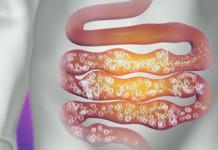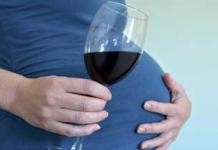Probably, each of us is familiar with the statement that alcohol adversely affects the state of the human body. But does alcohol affect conception, and if so, what effect? Let's try to figure it out.
How alcohol affects conception in women
 According to the study, any consumption of alcoholic beverages by a woman negatively affects the quality of her eggs. After all, female germ cells are “stored” in the body throughout the entire reproductive period. Therefore, alcohol can harm one or more of these eggs. And who can know which egg will meet with the sperm at the moment of conception - defective or complete?
According to the study, any consumption of alcoholic beverages by a woman negatively affects the quality of her eggs. After all, female germ cells are “stored” in the body throughout the entire reproductive period. Therefore, alcohol can harm one or more of these eggs. And who can know which egg will meet with the sperm at the moment of conception - defective or complete?
Suppose conception occurred with the participation of a normal female germ cell, but at that moment the expectant mother was under the influence of alcoholic beverages. Does alcohol affect conception in this case?
Scientists believe that in the pre-implantation period, that is, until the embryo is attached to the uterus, alcoholic beverages cannot harm it. At this time, his journey through the fallopian tubes is made, so he is not yet subject to negative effects. It is a completely different matter when the embryo is attached to the uterus - now all the substances used by the mother come to it.
Relatively recently, a study was conducted in Denmark, during which a completely unique fact was revealed. Those ladies who, before pregnancy and, accordingly, at the time of conception, drank 1-2 glasses (this is 150 ml) of dry wine per day, were pregnant twice as often. At the same time, the number of complications during pregnancy and childbirth, as well as the appearance of babies with birth defects, turned out to be much lower than in women who lead a correct lifestyle.
Scientists believe that such an effect of alcohol on conception is explained by the fact that dry wine can have a positive effect on a woman's hormonal background. In their opinion, conception after alcohol, if you drink, of course, dry wine, can be successful.
The effect of alcohol on conception in men
 Men face a more difficult situation. For them, doctors have the only recommendation - it is better not to plan conception after alcohol. This advice is easily explained.
Men face a more difficult situation. For them, doctors have the only recommendation - it is better not to plan conception after alcohol. This advice is easily explained.
The fact is that even a small dose of beer can reduce sperm activity by an impressive figure - by 18–22%. Therefore, drinking alcohol is especially dangerous for adolescents during puberty, since this factor often leads to infertility due to a sharp decrease in the number of motile spermatozoa.
True, there is an opinion that the process of sperm maturation is equal to three months. Therefore, conception after alcohol means that there will be no harm - “old” spermatozoa that are not damaged by alcohol will participate in the process of conception.
However, attention! Canadian scientists have found that alcohol and conception in men are things that should not be confused. This is due to the fact that alcohol can have an unusual effect on the spermatic fluid. As a result of this effect, the chances of connecting with the egg become equal for both full and defective spermatozoa. Therefore, conception after alcohol is a lottery, where the chances are 50/50. And remember, on the scales is the health of your future baby ...
Drinking alcohol before conception: how much can you drink?
Scientists have not yet been able to provide a definite answer to the question. After all, the reserves and abilities of each organism are completely different, therefore, for one man, 100 grams of wine is enough for the number of defective spermatozoa to increase dramatically, and for another, this figure should be significantly higher. The same applies to expectant mothers. Therefore, it is better not to drink alcohol before conceiving a child at all.
Summary
If you are planning a pregnancy, it is strongly recommended to completely and categorically refuse alcohol to both partners. Well, if alcohol was still present during conception, then you should not panic much. As a rule, in healthy people, healthy germ cells are most often involved in fertilization. A good mood and a confident look into the future - this is the key to a successful pregnancy and the birth of a healthy baby!
Girls! Let's do reposts.
Thanks to this, experts come to us and give answers to our questions!
Also, you can ask your question below. People like you or experts will give an answer.
Thanks ;-)
All healthy kids!
Ps. This applies to boys too! There are just more girls here ;-)
Did you like the material? Support - repost! We are trying for you ;-)
As medical practice shows, every third pregnancy occurs when one of the partners is intoxicated. Given this fact, it may seem that alcohol does not affect the course of pregnancy and does not harm the baby. In addition, some pregnant women periodically drink a little alcohol to relax.
But doctors warn that alcohol and pregnancy planning are 2 incompatible things. To understand why it is strictly forbidden to drink alcohol before conception, you need to understand the process of fertilization.
Is there a relationship between alcohol and the likelihood of successful conception?
It is not in vain that doctors advise couples planning to conceive a baby to refrain from drinking alcohol for several months. This is due not only to the fact that ethyl alcohol negatively affects reproductive function and can provoke the development of various pathologies in the baby. It has been scientifically proven that if both partners were intoxicated at the time of conception, the likelihood that conception will be successful is significantly reduced. The probability of a woman becoming pregnant remains, but it will be small.
Which alcohol is the most dangerous?

Variety of alcoholic drinks
The following drinks are considered the most harmful and dangerous before conception:
- Whiskey. To achieve a characteristic taste, various components are added to the drink, and in addition to them, it contains fusel oils, acetals (ethers), diacetyl. Most of these substances are moderately toxic, so the consumption of whiskey before conception can adversely affect the functioning of internal organs and systems.
- Cognac. The drink contains about 450 esters, acetals, various carboxyl and phenolic compounds, as well as higher alcohols. During the maturation of cognac spirit in oak barrels, tannins, furfural, lignin appear in it. More than 50% of these components are slightly toxic, so they can cause difficulties with conception.
How does alcohol affect the process of conception?
Drinking alcohol before conception is not recommended not only for women, but also for men. If a man drank alcohol the day before, ethyl alcohol will in any case penetrate into the seminal fluid, which will cause the modification of germ cells. As for the female body, if a woman did not take alcohol during the follicular phase of the cycle, then a small amount of it during conception will not affect the state of the egg in any way.
But it should be borne in mind that drinking can adversely affect the process of egg division and its movement through the fallopian tube after contact with the sperm. That is why the consumption of alcoholic beverages before conception often causes ectopic pregnancy, miscarriage, and detachment of the ovum.
Even if a woman can carry and give birth to a child, drinking alcohol before conception increases the risk of the following pathologies in the baby:
- weight deficit;
- weakened immunity;
- hyperactivity;
- insomnia;
- frequent headaches;
- low vitality.
If partners drank before conceiving a child, the risk of more dangerous consequences cannot be ruled out. In such babies, dementia or physical deformities are not ruled out, which are extremely problematic to correct.
Impact on male reproductive function
Since men's health is very important for conceiving a healthy baby, it is strongly not recommended to drink alcohol before such a responsible business. This is due to the fact that the composition of spermatozoa directly affects the health and viability of the unborn child. Toxins present in the composition of alcohol adversely affect all organs and systems of the body.

Including they destroy male germ cells and impair sperm motility. If most of the spermatozoa are inactive, conception may not happen. It should be borne in mind that normally each man initially has about 35% of abnormal spermatozoa. That is why a drinking man is much less likely to have offspring.
But even if conception occurs, it must be remembered that the toxins contained in alcohol change the DNA of spermatozoa, which is why they carry a damaged genetic code. It is impossible to predict how this will affect the child. At best, the newborn will simply have poor health, and at worst, physical anomalies, Down syndrome, cerebral palsy, and pathologies of internal organs.
It is also worth considering that regular drinking of alcoholic beverages impairs potency and leads to hormonal imbalance. Especially the risk of its development is high in men who consistently drink beer. If you constantly drink a foamy drink, the production of testosterone decreases, and the content of estrogen, on the contrary, increases. As a result, a man's libido is greatly reduced, and the body begins to change according to the female type.
On the female reproductive system
Due to physiological characteristics, the female body is even more susceptible to alcohol than the male body. After several glasses drunk, the fair sex gets drunk much faster, and the remains of ethyl alcohol are excreted from the body longer. Regular consumption of strong drinks can provoke the development of the following disorders:
- irregular menstrual cycle, accompanied by severe pain;
- early menopause;
- difficulties with bearing a child;
- high risk of ectopic pregnancy;
- problem childbirth;
- infertility.
The number of ovarian follicles in women is limited and does not change throughout life. If the follicle damaged by toxins matures into an egg and it is she who is fertilized, there is a risk of having a baby with serious pathologies.

On a note! Unlike male, female sex cells do not have the ability to renew, therefore, the fair sex should not drink alcohol not only during the planning period of the child, but also generally refuse alcohol.
How much should a man not drink before conception?
Before conception, a man needs a fairly long time to refrain from drinking alcohol. The maturation of new spermatozoa requires about 70 days. This is the minimum period during which a man should not drink alcohol. But most doctors advise extending this period to 3 months. Then the cells are guaranteed to have time to completely renew themselves, and the likelihood of detrimental consequences will be minimized. Also during this period, men are encouraged to exercise and eat right.
How much should a woman not drink before conception?
In order to give birth to a healthy baby, it is better for the fair sex to stop drinking long before pregnancy, and ideally stop drinking alcohol altogether. If this is difficult to do, then the minimum period of abstinence from alcohol is 30 days- It is during this period that the maturation of new eggs occurs. How much you can not drink alcohol before conception also depends on the state of health. If a woman has problems with the reproductive system, it is better to protect yourself from alcohol at least 4-5 months before the planned conception.
Possible consequences of drunken conception
If a man or woman drank before conception, the risk of complications that may occur during the carrying of a baby or after his birth increases several times. And this applies not only to strong drinks, but also to beer.

If conception occurred after drinking alcohol, the consequences may be as follows:
- intrauterine growth retardation, characterized by a lack of weight and growth;
- physiological anomalies in appearance (cleft lip, cleft palate, eye defect, fusion of fingers, short feet);
- cardiovascular pathologies;
- liver and kidney failure;
- cerebral palsy.
It should be borne in mind that most congenital pathologies are not treatable and negatively affect the rest of life.
Conclusion
Every married couple hopes that alcohol consumption will not affect the health of the unborn baby in any way. And, indeed, in most cases, parents who drink alcohol moderately have healthy children. But 15 out of 1000 newborns are born with serious anomalies, which is caused precisely by exposure to ethyl alcohol.
Discussions about whether alcohol is harmful or not when planning a pregnancy are actively conducted by both ordinary people and specialists. From numerous studies and statistics, one conclusion can be drawn: everything is harmful for a woman, except for natural dry red wine, and a man can occasionally afford some high-quality strong alcohol. It should be noted that this is true only for healthy people. It cannot be categorically stated that the use of alcohol during preparation for conception will certainly lead to the birth of a sick child or even to infertility. However, its exclusion has been proven to reduce such risks, which is certainly important for expectant parents.
For the female reproductive system, alcohol is much more dangerous than for the male. The reason is that the sperm reserve is completely renewed after 73 days, and the set of female eggs (oocytes located in the follicles) is incorporated from childhood and is fixed. The first of them appear as early as 11 weeks of fetal development. By the time of puberty, the number of oocyte rudiments is 200-300 thousand, and by the age of 35 only 25 thousand remain.
Ovarian tissues are a reliable defense against external toxins, but not from ethyl alcohol. This is a good solvent that easily penetrates tissue barriers, each time damaging several egg primordia and destroying the DNA embedded in them. The danger lies in the fact that the damaged cells do not disappear, but remain in the ovary and will participate in ovulation.
Drinking alcohol while planning pregnancy and during it will have a detrimental effect on several generations. The germ cells of girls will also contain damaged DNA and their number will be significantly less than normal. That is, parents who abuse alcohol doom their children not only to health problems, but also to potential infertility.
A woman may not drink for a month, a year or two before conceiving a child, but this will not save the situation if alcohol was previously present in the body regularly. Oocytes damaged by toxins do not regenerate. The conception of a healthy child in this case becomes a lottery, since it is not known whether a healthy or damaged egg will leave the follicle for fertilization.
The negative impact of alcohol on the female reproductive system is manifested in several other areas:
- Violation of the hormonal background;
- Failure of the ovulatory cycle (the egg does not leave the follicle or the process occurs with violations);
- Approaching the onset of menopause.
Video on the topic "Alcohol and fetal development in the womb"
The effect of alcohol on male fertility
The male reproductive system also suffers from alcohol abuse. Spermatozoa are renewed, but the source of their renewal, the spermatogenic epithelium, suffers from ethyl alcohol. Alcohol is a powerful mutagen that causes pathological transformation and cell dysfunction.
In the genitals, as well as in the brain and pancreas, the decay products of alcohol persist for 25 days. During this period, more than 125 million spermatozoa are formed with alcohol-damaged DNA, impaired morphology and poor mobility. With regular intake of alcohol, including beer, for several years there are almost no healthy germ cells in the testicles (dysfunction of the spermatogenic epithelium plays a role).
Urologist-andrologist Cherepanov Denis Anatolyevich about alcohol intake during pregnancy planning
Narcologists warn that alcoholism is a threat to the genetic code of the nation, so it is important to explain to a teenager from childhood what alcohol consumption will threaten later.
How often do you drink alcohol (wine, beer, vodka, cognac, whiskey, moonshine)?
Poll Options are limited because JavaScript is disabled in your browser.
Several times a week 26%, 86 votes
I don't drink alcohol at all 7%, 22 vote
Every night 100 grams * 0%, 1 voice
06.09.2019
* - added by a visitor
What alcohol is the most dangerous
Any alcohol is dangerous in large quantities, and in the period of preparation for conception, it is better to completely exclude it. If we talk about the degree of harm, then in the first place are sweet carbonated low-alcohol drinks and a variety of cheap industrial tinctures. On the second - homemade wine and moonshine (technological errors, a large amount of fusel oils and other toxins). On the third - vodka, cognac, wine.
As for beer (natural), along with vitamins, it contains phytohormones that shift the hormonal balance of a man towards estrogens (the stomach, chest grows, shoulders narrow), spermatogenesis is disturbed. In two bottles - already a daily dose of female hormones. From one glass a week, the reproductive organs will not be significantly affected, but few people limit themselves to such an amount. It is not in vain that women insist on husbands refusing beer in the period of preparation for conception - spermogram parameters improve (an example of a review on the forum: https://eva.ru/static/forums/49/2007_7/1011709.html).
 The belly grows in men not from beer, but from an increase in the amount of snacks eaten along with beer. Without controlling his diet, a man accumulates visceral fat around the internal organs, forming the same “beer belly”
The belly grows in men not from beer, but from an increase in the amount of snacks eaten along with beer. Without controlling his diet, a man accumulates visceral fat around the internal organs, forming the same “beer belly” Many men find an outlet in non-alcoholic beer, but this drink, although it contains a small amount of alcohol (from 0.5 to 1.5 degrees), is highly undesirable during the conception period. In the memos, which contain recommendations for improving performance before taking a spermogram, it is recommended to exclude products with a high content of preservatives, dyes and taste improvers. A prominent representative of this group is non-alcoholic beer.
Is red dry wine the safest type of alcohol?
The French vehemently insist that there is no harm in drinking natural wine every day. In this country, not a single meal can do without it. In preparation for pregnancy and already pregnant women, doctors themselves sometimes recommend drinking a glass of dry red wine 2-3 times a week. This is the so-called French paradox - people drink regularly, but at the same time they suffer less from cardiovascular and oncological diseases, unlike teetotalers (the risk is reduced by 40 and 20%, respectively).
Scientists from the Universities of Bordeaux (University of Bordeaux) and Paris (Université de Paris) have been engaged in a study for more than 28 years, during which they monitored the health of 35 thousand men. One part of them moderately used dry red wine, the other led a sober lifestyle. As a result, the health of the representatives of the first group really turned out to be better. The reason is the high content of resveratrol, potassium, magnesium, zinc, iron, antioxidants, organic acids, vitamins C, B1, B2. Resveratrol has an antitumor, anti-inflammatory and sugar-lowering effect (based on the materials of the Korrespondent magazine No. 30 of 08/02/2013).
High-quality dry red wine can really be useful in the period of preparation for pregnancy, but subject to proper use (men 2-3 glasses a week). Women are advised to drink it no more than once a week and diluted with water.
What to do if conception occurred while intoxicated
Many women ask this question to their doctors, to which they answer: “Nothing.” The most reasonable thing in this case is to calm down, stop engaging in self-criticism and read about the horrors of "drunken conception." Neurosis and the expectation of problems will affect the health of the expectant mother even worse than alcohol itself.
As for men, the effect of alcohol on spermatozoa is to equalize their parameters. This means that the competition between full and defective forms disappears, and the chance of fertilization by the latter increases significantly. Possible consequences:
- Frozen pregnancy.
- Miscarriage.
- Pathology of fetal development.
The consequences of drinking alcohol before conception can manifest itself after a few years in the lag of the physical or mental development of the child, hormonal disruptions, and various syndromes (inattention, hypermobility).
Many will object that most conceptions occur after drinking alcohol, but the child is born and develops completely normally. This statistic is explained as follows:
- The degree of the negative impact of alcohol depends on its quality and quantity (there is a difference between "singed" vodka from the "night light" in unlimited quantities and a couple of glasses of good wine).
- The opinion regarding the absence of the negative effects of alcohol is subjective. Few people admit that their child has some deviations. Even fewer people will associate it with drinking alcohol during conception.
- Each person has his own level of metabolism and activity of the body's defenses. This is determined not only by lifestyle, but also by genetics. In some, alcohol quickly breaks down and is excreted (respectively, the effect on germ cells is minimized), while in others it lingers for a long time and manages to cause serious damage to reproductive health.
If during the period of preparation for conception "had" to drink a serious amount of alcohol, then all that can be done to minimize the harm is to try to remove it from the blood faster. Main ways:
- Drink 10 activated charcoal tablets. A more effective and safer alternative is Enterosgel in the amount of two tablespoons diluted in a glass of water.
- Drink 200 ml of milk every hour. Milk effectively removes toxins.
- Drink more fluids, citrus juices, weak green tea with honey.
 Enterosgel is an enterosorbent that has a detoxifying, enveloping and antidiarrheal effect. Price from 383 rubles.
Enterosgel is an enterosorbent that has a detoxifying, enveloping and antidiarrheal effect. Price from 383 rubles. Of the drugs, you can drink Zorex or Regidron. Their active substances will help to quickly neutralize the breakdown products of alcohol and normalize the water-salt balance in the body.
The opinion of doctors about alcohol, alcohol in preparation for IVF
Most doctors do not see anything fatal in the fact that the conception itself occurred during a period of mild alcohol intoxication. The main thing is that ethanol does not enter the body regularly.. It is advisable to stop drinking alcohol at least 3 months before the expected moment of conception. This applies only to men, since the composition of spermatozoa will be updated during this period. On the part of a woman, such a measure will only help improve the condition of the organs, normalize the hormonal balance.
On thematic forums (for example: http://www.probirka.org/forum/viewtopic.php?f=163&t=21028), participants share tips on preparing couples for conception, including the IVF method. Many of them asked doctors questions about the permissible amount and types of alcohol. Most andrologists and embryologists are categorically opposed only to beer("better a glass of vodka or a glass of red wine").
Complete abstinence from alcohol is easier for women than for men. On the latter, a categorical ban can have the opposite effect of what is desired: due to constant neurosis and depression, sperm quality will deteriorate, libido will decrease, many couples quarrel, not reaching the IVF protocol at all. That is why doctors allow the use of 50-100 g of vodka, cognac or 250 g of dry red wine 2-3 times a week.
Conclusion
In conclusion, we can recall the words of the ancient healer Paracelsus that any medicine in large quantities becomes poison, and poison in a small dose can be medicine. In part, the statement can be extrapolated to alcohol: high-quality drinks in small quantities (against the background of good nutrition, regular physical activity and good health) will not bring much harm, and in the absence of measures, they will poison the body and lead to infertility. By nature, a woman has a great responsibility in terms of procreation, she is more vulnerable to alcohol, and therefore she should take care of herself more carefully. In any case, before conception, it is better for both of them to refrain from alcohol (especially since a quality product is difficult to find on the shelves of the mass market) than to later blame yourself for the pathologies of the child.
Alcohol and conception - consequences for the child
Alcohol before conception
Alcohol and conception are incompatible concepts, and all because future offspring may have serious health problems.
Before getting pregnant, a woman should follow a healthy lifestyle. In this case, it is necessary to exclude bad habits, because drinking alcohol affects the health of the baby. However, in most cases, children are born unplanned. How does alcohol affect conception in this case? It is necessary to monitor the amount of alcohol you drink, because it can affect the female reproductive system and the state of the egg.
How does alcohol affect conception in women?
Does alcohol affect conception if a woman drank? During pregnancy, the woman is responsible for the birth of children. Therefore, before you conceive a child, you need to make sure that there are no health problems. Even before conception, a woman's body has a certain number of eggs that go through the maturation stage during menstruation.
A drinking person needs to think about observing a healthy lifestyle so that the continuation of the family is without pathologies. This must be done not only on the day of conception, but also before planning.
Alcohol after conception should not be practiced. When exposed to alcohol on the body, adverse effects can be achieved. If you drink alcohol daily, then a change in all available eggs may occur.
The effect of maternal alcoholism on the fetus.
This process does not affect conception in the best way: infertility, problems with bearing a child, difficult childbirth, and pathologies in the baby may develop.
Influence on the conception of alcoholism in men.
The influence of alcohol on the conception of a child in men is due to their participation in the process of fertilization. Most men agree that alcohol during conception does not play a significant role, because a woman will need to bear offspring. But this opinion is wrong. Everyone knows that a child can be born only with the participation of sperm in the process of fertilization. That is why you need to monitor how much alcohol is drunk not only for a woman, but also for a man. This is necessary to maintain male reproductive function. The sperm gives an equal part of the genetic information to the unborn baby. How does alcohol affect conception in men? In order to avoid undesirable consequences, it is necessary to give the embryo a good set of chromosomes from both parents.
Alcoholic products will affect the sperm instantly, it can immobilize them or damage them a little.
The most dangerous outcome of the whole situation is to see them increase in size - drunk sperm will not lead to anything good.
Despite this, with the correct course of fertilization, diseases or abnormal development of the fetus can be detected at a short gestation period.
Taking alcohol, the conception of a man must prepare for some time. After how much? It is generally accepted that this should be done 160 days before planning the offspring. This interval is not set by chance - the replacement of sperm with a new one will occur at this moment. In addition, with male diseases and addictions, it is still worth being examined by professionals. This should be done by two parents - such a matter cannot be postponed.
But taking such measures is not always effective. Conception under alcohol can affect the quality of the material for 10 years. Therefore, male alcoholics often develop infertility. In this case, you should forget about the child.
Alcohol before conception
Is it possible to drink alcohol-containing drinks during conception? It is absolutely impossible to do this. At the same time, adverse effects are possible with mild intoxication. This is due to the fact that alcohol appears in the sperm, and therefore fertilization is undesirable. Such reflections indicate that participating in the process while intoxicated can harm the unborn child. However, there are other reasons as well.
In the male body, there are active and passive spermatozoa. During the last action, the reaction of active ones slows down, and other spermatozoa also enter the struggle for fertilization. Now the defective spermatozoon has more chances. If the husband drinks, then it is too early to think about conception. Such a person will become dangerous for the baby.
Most women have alcohol at conception. In this case, pregnancy occurs suddenly, while not one of the partners is ready for it. In the absence of obvious signs of an interesting situation, a woman drinks more alcohol. However, if the drink was drunk in the first week after conception, then there is no concern for the health of the fetus. This is due to the implantation of the egg, which occurs in this gap. At the same time, nutrition occurs at the expense of its own resources, the child does not yet feel a connection with the parent. Taking alcohol after that is likely to provoke rejection of the embryo.
Science says that drinking alcohol while preparing for pregnancy is prohibited. Many do not even think, succumbing to temporary pleasure, how a drunken conception can affect. And only after the fact of pregnancy is confirmed, future parents begin to worry about how alcohol affects the body during conception. In our article, we will try to figure out what is fraught with conception while intoxicated, and also separately consider the effect of alcohol on the conception of a child in men, women and on the unborn baby.
Alcohol and male reproductive function
The health of the child is laid in the womb. And everyone knows that the state of health of mom and dad, their genetics, have a direct impact on the formation of the fetus. Inherent genetic mutations, as well as the impact of existing diseases in parents, have a deplorable effect on the unborn baby.
Men are more careless about this, thinking that if it is not for them to bear a baby, then there is nothing to worry about. Often, a man does not think about whether it is possible to drink alcohol during the period of conception and how a drunken conception affects him (as a carrier of the gene pool) and the unborn child. In our society, most men believe that taking care of children and caring for health is a purely female prerogative, and their only task is to earn money.
Let's look at how alcohol affects fertility, what happens to male sperm with and without alcohol intoxication. A healthy man who does not take alcohol at all has a 25% deviation in the spermogram. This means that only a quarter of the sperm are not capable of fertilization. At the same time, in a man who drinks alcohol, the number of spermatozoa incapable of fertilization increases significantly. This is due to the fact that ethanol, once in the seminal fluid, causes a number of irreversible pathological changes. As a result of this, abnormalities are formed in the chromosomes of male germ cells.
Even if only a man drinks alcohol at conception, there is a high risk that a defective, abnormal spermatozoon will fertilize the egg, which will lead to a serious genetic mutation in the child.
Attention! The amount of alcohol in the blood is directly proportional to its content in seminal fluid. Thus, the more alcohol a man drinks, the higher the risk of conceiving an unhealthy child.
Alcohol and women's reproductive function

All the eggs that will mature every month in a woman are laid before her birth. Their number decreases with each cycle of menstruation and no new ones are formed, which is fundamentally different from the formation of male sperm. Only one egg matures every month, and several factors influence its formation at once.
Ethanol is one of the few poisons that can penetrate the ovaries and cause irreparable harm to the gene pool. Under its influence, irreversible changes occur in the chromosomes. And if a woman regularly or for a long time, even in small quantities, consumed alcohol, then this does not affect conception from the best side. In addition, alcohol has a "cumulative" effect on the female reproductive system, and changes in chromosomes are not treatable. Those eggs that are damaged by ethanol will remain in the body until they are released with menstruation or are fertilized.
If, however, conception has taken place, then the egg may not attach well to the wall of the uterus, thereby increasing the risk of spontaneous miscarriage. This may simply not be noticed by the woman, and the fertilized egg will simply come out with menstrual blood, or severe bleeding or heavy menstruation may begin.
If the egg is attached to the wall of the uterus, then cell division and the formation of the fetus begin. Vital organs, brain, skeletal system, spinal cord are laid. Alcohol consumed before conception can create gene mutations, as a result of which a child may be born with injuries, severe mental illness, or underdevelopment.
It should be remembered that alcohol is excreted from the body of a man for at least a day after the last glass drunk, and for a woman for two days. During this period, it is strictly not recommended to conceive a child. And, given the natural characteristics of female eggs, women of childbearing age are not recommended to drink alcohol at all.
Reference: It has been scientifically proven that even the smallest amounts of ethanol are harmful to the fetus, at any stage of its development. The myth about the benefits of red wine for a pregnant woman has long been debunked, and its detrimental effect has been proven. However, many still continue to believe in this, giving in more to their sense of pleasure from alcohol than to common sense.
Possible pathologies from alcohol

Conception that occurred while intoxicated by at least one of the parents can cause the following disorders in children:
- Low weight in a newborn (often observed in children of alcoholics);
- Too small height of the child (in comparison with peers);
- Underdevelopment of organs;
- Central nervous system disorders:
- Unfused spinal canal;
- Underdeveloped brain (manifested in intellectual and neurological disorders of children);
- Fetal hypoxia;
- Violation of the functions of the umbilical cord, placenta;
- DNA damage causing mutilation, the most common of which are:
- On the part of the internal organs - a defect in the genital organs, joints, heart disease in children;
- From the side of the face - a shortened back of the nose, underdevelopment of the lower jaw;
- On the part of the body - a disproportionate size of the head, limbs.
Permissible amount of alcohol at conception

Many, especially young couples, are wondering how much alcohol you can drink before intercourse, before conception. It is important to prioritize correctly here. First, figure out what is more important for you to have momentary fun and pleasure under the influence of alcohol, or the birth and life of your baby? How comparable are these things, alcohol and having children?
One thing is known for certain - there is not even a minimum dose of alcohol, the intake of which is permissible at conception. Alcohol affects conception even in the amount of 3 grams of ethylene, and this amount is already fatal. Alcohol during conception and pregnancy is contraindicated. For the same reason, pregnant women are forbidden to take alcohol-containing medicines.
The influence of alcohol on the body of an adult organism depends on its individual characteristics. Someone calmly tolerates one glass of beer, and for someone 50 grams of a low-alcohol drink is enough for the development of anomalies and pathologies. There is no norm of alcohol that can be called harmless.
Attention! Even the smallest amount of alcohol can ruin the life of your unborn child.
If alcohol was drunk at conception

If you or your partner drank alcohol before conception, during or after conception, then first of all you need to decide on the amount of alcohol you drink. Taken into account: day, week and last month. In the absence of alcohol dependence, there is a fairly high chance of having a healthy baby.
Immediately after conception, you must adhere to the following rules:
- Mandatory consultation with an obstetrician-gynecologist. Pass all clinical and laboratory tests, and a man to pass a spermogram. At your doctor's appointment, tell your doctor honestly that you or your partner were drunk at the time of conception, and also drown the amount of alcohol you drank that day or the day before;
- Completely refuse to take alcoholic beverages and medicines containing alcohol;
- Increase the consumption of easily digestible protein foods;
- Refuse to eat fast food, as well as red meat, raw milk, margarine and other heavy fats;
- Start taking a multivitamin made specifically for pregnant women. They contain a maximum of iron, and folic acid;
- Walk more in the fresh air, adequately and regularly engage in physical education for pregnant women;
- Quit smoking completely. Cigarettes, no less negative than alcohol, can affect the development of the fetus;
- Avoid or minimize caffeinated drinks;
- Watch your well-being, more positive emotions. Do not take part in stressful situations, quarrels and conflicts.
Note! If you are going to conceive a baby, then you should completely abandon bad habits, eating low-quality food and alcohol 3-6 months before the date of conception.




















